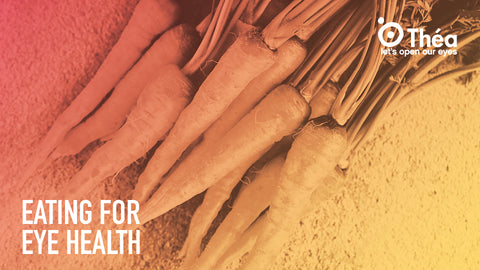A Feast for the Eyes

“Eat your carrots, they’ll help you see in the dark!”, sound familiar? Is there any truth behind the household phrase, and are carrots even the best food available for your eyes?
Why you should eat for eye health.
The leading cause of sight loss in the UK is age-related macular degeneration (AMD)[1].
The good news is that research suggests that eating a healthy diet rich in certain nutrients, can help lower your risk of developing this condition. In the spotlight are antioxidant vitamins and minerals and Omega 3.
You are what you eat
The truth is, we do need to eat vegetables and fruits to look after our eye health. Our macula (the part of the eye responsible for our central vision) depends on essential antioxidants Lutein and Zeaxanthin, which create a protective layer known as the macular pigment. Macular pigment functions like internal sunglasses, protecting the macula from the damaging effects of blue light and oxidative stress. These key ingredients cannot be made in our bodies, meaning we need to find these in our diet.
Carrots can help here, but to achieve the daily levels to help your eyes you’d need to eat 83 a day! Foods with higher levels of Lutein and Zeaxanthin include:
- Kale
- Spinach
- Broccoli
- Bell Peppers
It’s not all about carrots
There are plenty of other vitamins and minerals that have been shown to be beneficial to eye health but what are they, and in what foods and supplements can we find them?
Vitamin C – an antioxidant that can protect your eyes against the damaging effects of oxidative stress. Found in Citrus Fruit and Bell Peppers
Zinc – a key player in eye health shown to maintain vision. Found in chickpeas, lentils, shellfish and red meats.
Omega 3 – helps with conditions such as dry eye and reduces inflammation, a great all-rounder for eye health. The best sources are oily fish such as mackerel and sardines with several vegetarian and vegan alternatives now being available.
Resveratrol – a powerful antioxidant that has been shown to protect retinal cells and help prevent cell damage. Found in small amounts in red wine and dark chocolate which may sound exciting, but it’s important to consider the other ingredients of these foods and their effects on your overall health.
Vitamin D – known as the sunshine vitamin, vitamin D is formed after exposure to the sun and also in small amounts in fish and eggs. Many foods are fortified with vitamin D in the UK because of the low levels of sunlight and worries of deficiencies, these include cereals, margarine and milk. Deficiencies in vitamin D are linked to several eye conditions
Changing your diet dramatically can be a challenge. A good starting point is increasing the amount of brightly coloured fruits and vegetables and dark leafy greens. Alternatively you could get your daily dose of the vitamins you need for your eyes with Nutrof® Total. Nutrof Total is available to buy. It is a specially formulated multivitamin aimed at supporting your eye health.
